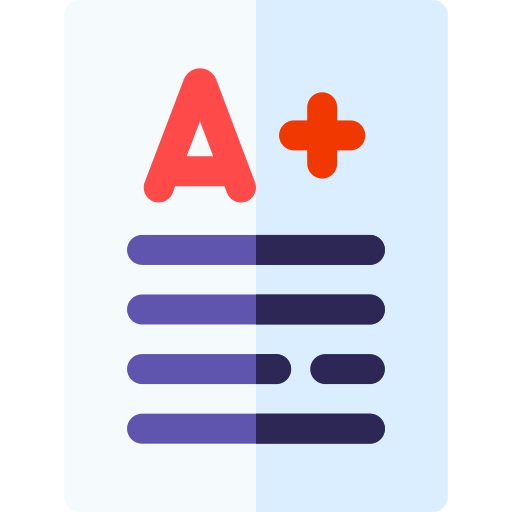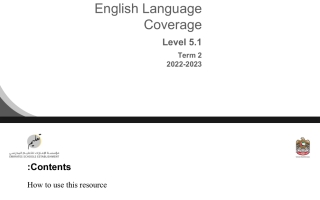بوربوينت قواعد ووظائف نهاية الفصل الثاني اللغة الإنجليزية الصف الثامن
The Coverage, Grammar and Functional Language Teaching Resource
The slides within this resource, although detailed, are designed to be used as a starting point for teachers to construct lessons around the language points that are explored here. The slides are intended to be used individually as a resource within a lesson and to be incorporated as part of instruction incrementally throughout the term to ensure that students have been exposed to all the language points in the mverage ahead of their end of term exam. Therefore. the PowerPoint should not be presented at a single event or in its entirety. Some functional language points may overlap with grammatical points in the coverage, and in that case, it is possible to combine slides. However, this resource should be
considered to be a collection of individual slides that teachers can use to enhance stucknts' learning
Within this document, you will find information about the coverage for this term. The lexis family that assessrnents will contain is mentioned as well as the particular grarnmatical and functional language points that will be tested in the exams at the end of this terrn. In the preparation sections, you will find examples and explanations for the grammatical and functional language points that will be assessed this term
The grammar preparation section has an example sentence that illustrates the grammatical point. It follows this with an explanation of the meaning of the example sentence. Next, the specific grammatical structure used within the example sentence is detailed followed by an explanation of the circumstances under whidl the particular structure is used. More example sentences using the structure are given at the end of the slide. In the functional language preparation section. there are examples of the particular language point followed by an explanation of how the particular are used. In the associated grammar section, language points that comprise the structure or can be used to in conjunction with the language
I am taller than my brother
The book was more -exciting_than the film
TV is as interesting as cinema nowadays
Meaning is mmparing his height with trothers, books witl films and TV with cinema
comparatves
subject * (to be) comparative + han ruin as • (adjective / adverb)
We use comparatives to tnnpare the same quality in two things. TO compare one thing with another wren the comiiåons are unequal. we use a comparative by than' To form a cornparative, we usually use —er for one or two syl able (smaller) while mcre is used hr adjÉcives (more successful). When want to say Miat as' with an that relates b two things are use as the quality we are mmparing in th gab
The new smartphone is a new computer
The job interview was the actual work
Maitha was to buy a car to travel to europe
Kasim bought car in the showroom. He drove the car on the- mgest road in the UAE and damaged the engine
Meaning In the past went to This means tlat they can find excitng plaæs to go in Dubai now
Present simple
have / has + past participle
We can use the present simple to talk at:nut an action that finished in the past but is still connected to present It fæuses on the result of the prevOus action. In the example the only knows DLLai now Oley have bæn frere in past
You've deaned your room, so you can and ride your bike row
Have you seen those movies
I've searched for more than three hours and still cannot fhd the house
to the Grand Mosque in Abu Dhabi
The speaker is somarte if trey have attended the Grand Mosque at any ime in their life
Present simple (questions using 'ever')
Have / Has + subject + ever + past pariciple
We can use present perfect simple witl to ask someone's in the past up b the time
Has he ever played online games with his friends
Have thev ever watched any Bollywood movies
Has -she -even eaten sushi
The sister had told him /her in a previous conversation when the film is available
present and future plans
Subject + verb + that + noun clauæ
We use reportEd sbÉments to repeat what someone previously said statements use frat' and a Énse that is (one step further into the past than the original In the example the direct spæch '.wuld tz "The film will next week." When we report it, we backshift 'will' to 'would
Maryam reporÉd the company be giving pay rises
My mother said she take us to the show The said that the doæd for a week
The is that the weather in future WiII wet
Future time going to
subject + (to be) + to + infinitive
In this case, going b' is with verb 'be and the infinitive of the main verb to talk future events aM situabons
They are going to win the competition week
We are going to have a lot of fun at the restaurant later
He is going to good a score in his exarn
Although I like social media, I try not to use it every day
Even though I read the instructions, I could not set up my computer
Shopping online is easy but going to the mall can be tiring
Functional language point Comparing and contrasting
Associated grammar Adverbial linkers, subordinating conjunctions
After studying for three years, I got a first-class degree in media studies
I heard that the UAE made an action movie in Media City
As soon as I graduated, I got a job supporting a director
Functional language point Describing past experiences and events
Associated grammar Past simple, past continuous, adjectives
I want to get a job as an events manager
I hope to own my own social media platform someday
I am planning on going to the cinema with my family this weekend
Functional language point Describing hopes and plans
Associated grammar Future time (will / going to), time phrases
I love learning about anything in digital media
I don't enjoy any kinds of sports
I am crazy about travelling. I can't wait to travel again next year
Functional language point Expressing likes and dislikes
Associated grammar Noun phrases, like + gerunds, like + to + infinitive, adverbs



